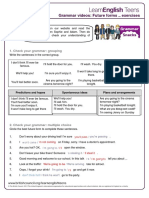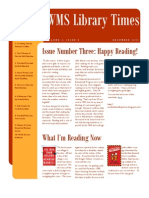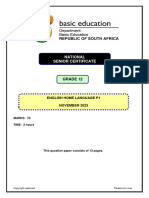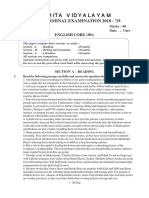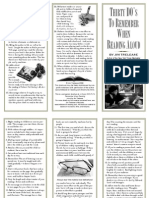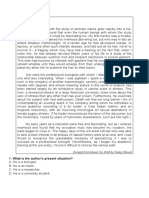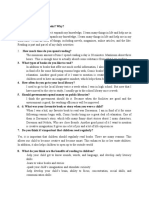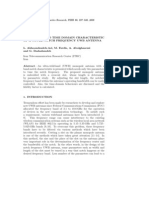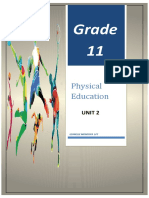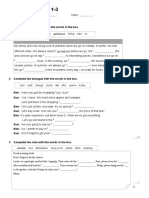StudentQuestionSheet - READING&USE OF ENGLISH
StudentQuestionSheet - READING&USE OF ENGLISH
Uploaded by
garaziskillsCopyright:
Available Formats
StudentQuestionSheet - READING&USE OF ENGLISH
StudentQuestionSheet - READING&USE OF ENGLISH
Uploaded by
garaziskillsOriginal Title
Copyright
Available Formats
Share this document
Did you find this document useful?
Is this content inappropriate?
Copyright:
Available Formats
StudentQuestionSheet - READING&USE OF ENGLISH
StudentQuestionSheet - READING&USE OF ENGLISH
Uploaded by
garaziskillsCopyright:
Available Formats
Student Question Sheet
Assessment Name: EndofCourseREADandUE
Student Name:
1. You are going to read an article about reading and childhood. For each question, choose the
answer which you think fits best according to the text.
Where are all the young bookworms?
I fondly remember the simplicity of the 1980s and 1990s, an age before smartphones, endless social media feeds and non-stop
digital interruptions to daily life. It was a time when, if you had a favourite TV show, you had to be watching the right channel at the
right time or you would miss it. Music came on cassettes and CDs, usually in album form, meaning you genuinely got to know and
love the full catalogue of your favourite musicians. You had to know the telephone number of your friend’s house off by heart. But
reading books is what I best remember – reams and reams of books to be devoured in peace and quiet, often by torchlight under the
covers when you should have been asleep.
Well, that was certainly true in my case. Being the youngest in a family of four – all avid readers – I had no end of books to choose
from. The subject matter was rarely important: science fiction, adventure, mystery – they all allowed me to escape into worlds of
colour, intrigue and action. Admittedly, I did have my regular go-to genres, but the truth was that I had an insatiable appetite for any
kind of writing. When my concerned mother saw me reading the phone book having exhausted all other options at home, she
promptly took me to the library and got me my membership. My world quadrupled in size.
And I was hardly alone in this. Several of my classmates and friends were similarly hooked, albeit not to the same extent, and we
frequently exchanged our latest favourites amid the usual warnings not to dog-ear the pages or damage the spines. Reading was, to
a large extent, a shared event: getting immersed in the same stories, following the adventures of the same characters and, in our
minds at least, critically evaluating the fiction we had read and anticipating what we were going to read next. Of course, many
eventually grew out of this reading obsession, as is normal when other activities such as sports or computer games or relationships
start gaining prominence, not to mention the demands of schoolwork and examinations during our teenage years. But for me, it never
faded.
But let’s take a look at what is happening around us in terms of reading habits amongst our children. Since the turn of the millennium,
the number of children who regularly read for pleasure has been in constant decline. Now, this is hardly shocking: the allure of
screens, video games and brief bite-sized videos are stiff competition for the traditional paper book. It has been suggested that
attention spans have waned as we are bombarded with online content. It seems possible that constant connectivity has resulted in a
thirst for instant gratification that the format of the beloved book simply fails to offer. Some would argue that the dwindling number of
children gobbling up books is nothing to be worried about, that we are simply evolving to a more modern means of consuming fiction,
and point to the fact that the novel only appeared a few centuries ago despite the written word having been around for a few
millennia.
Well, I take the opposite stance. I may be enthralled by the smell of a bookshop, or comforted by the quiet rustle of flicking pages in
libraries, but I would be the first to admit that format is not an issue. The content – those worlds that whisked me away from my reality
as a child – can still exist, and it does, in digital format. There is absolutely no reason to abandon the cause of encouraging our
youngsters to read. They can do so on screens, they can even listen to them. The latter, while not exactly the same as absorbing the
written word, can at least spark some interest, be a springboard if you like, to the possibilities of imagination that are available in a
plethora of books.
To finish off my rant, and hopefully sign off on a positive note, there are some simple steps we can take as parents to keep that
passion we enjoyed as children alive (tried and tested on my own two children). Read yourself. Letting them see you enjoy it sets a
good example – trust me, they’ll be curious. Go to libraries, but do so at leisure. Let them take their time, browse and choose what
they like. Make a comfy corner in your home just for reading. These are achievable goals that will encourage them to at least explore
the world of books. Nobody wants to enforce a habit on somebody else just because they enjoy it themselves, but at least let them
sample it for themselves.
© Macmillan Education Ltd. 2024, with additional User contributions.
Page: 1 of 11
Student Question Sheet
Assessment Name: EndofCourseREADandUE
Student Name:
1. What point is the author making in the first paragraph about life in the 1980s and 1990s?
a It was enjoyable due to the lack of distractions.
b It was restrictive in terms of what you could do.
c It was backward because of the lack of technology.
d It was repetitive as a result of the limited options.
2. What does the author imply when she mentions her ‘concerned mother’?
a Her mother was worried she was reading too much.
b Her mother found the content of some books inappropriate.
c Her mother feared she would start telephoning strangers.
d Her mother realised she had run out of books to read.
3. When talking about swapping books with classmates, the author mentions
a the difficulty in combining exchanges with other activities.
b the fact that they rarely liked the same material.
c an annoyance that some books were not yet available.
d concerns about returning the book in good condition.
4. The author notes that it is unsurprising that
a certain people have no concerns about fewer children reading.
b a form of fiction has only been around for a few hundred years.
c contemporary videos are largely in shorter formats.
d a shrinking number of youngsters enjoy reading.
5. What point is the author making in the fifth paragraph?
a Generating an interest in reading is key regardless how this is achieved.
b Listening to audiobooks fails to capture the imagination of children.
c Bookshops and libraries are unattractive places for children.
d The content of books should be made more accessible in digital format.
© Macmillan Education Ltd. 2024, with additional User contributions.
Page: 2 of 11
Student Question Sheet
Assessment Name: EndofCourseREADandUE
Student Name:
6. What conclusion does the author make in the final paragraph?
a Reading should be encouraged without being imposed.
b Children will only read if their parents also read to them.
c Libraries should be better equipped to encourage children to read.
d She has ultimately failed to instill a love of reading in her own children.
2. Complete the second sentence so that it has a similar meaning to the first sentence, using the
word given. Do not change the word given. You must use between three and eight words, including
the word given.
Example: The meeting should have taken place this morning, but the minister cancelled at the last minute.
MEANT
The meeting WAS MEANT TO HAVE BEEN held this morning, but the minister cancelled at the last minute.
Susanna became familiar with using the new software quite quickly and is now an expert user.
ROPES
in using the software quite quickly, Susanna is now an expert user.
3. Read an article from a literary website where people are discussing different forms of art. For each
question, choose from the contributors (A–D). The contributors may be chosen more than once.
Art forms – your experiences
Read some contributions from our readers on their experiences with different forms of art.
A – Clíodhna, Dublin
It’s one of the perks of living in a city, isn’t it, access to an array of cultural events. For my part, I tend to take advantage of the less
well-known productions. It’s not that there is any shortage of critically acclaimed star-studded performances in the huge number of
theatres we are lucky enough to have here. It’s just that I’ve always sought out up-and-coming writers and directors who deserve our
support just as much as their successful peers. Quite frankly, tickets for the box-office hits tend to be rather on the extortionate end of
the scale. I prefer the more affordable option of attending one of our smaller venues to watch a range of offerings of high quality that
can often be spine-tingling. One such performance I went to recently reduced both me and my friend to tears – the passion with
which the lead actor performed her role will stand out in my mind for an extremely long time to come.
B – Rajesh, Mumbai
I’ve spent my entire life as a bookworm. In fact, I challenge you to name any of the classics, or indeed any of what have come to be
known as ‘cult classics’, and find one I have not read. My pleasure at devouring books – I probably got through three per week –
sadly became more diminished as my eyesight began to fail. It wasn’t so much that I couldn’t see the words on the page, more that it
© Macmillan Education Ltd. 2024, with additional User contributions.
Page: 3 of 11
Student Question Sheet
Assessment Name: EndofCourseREADandUE
Student Name:
just got so tiring. My son, for years banging on about my need for one of those large TV screens, finally convinced me to invest in one
and, loath as I am to admit it, I am extremely taken with it and what is available for viewing. The quality of some series – and I mean
everything from the writing, the character development and the twists to the casting and the production itself – never ceases to
amaze me. For me, this is the new novel, a new form of visual literature that I can immerse myself in without my poor eyes getting
tired. I will never lose my love for books, but I am one very content consumer of TV.
C – Richard, Vancouver
Last year, my wife splashed out on two tickets for something called immersive theatre as a birthday present for me. I feigned
excitement, but the reality was I had never put myself down as fan of drama or the arts and it surprised me that my wife would even
consider this as a gift, particularly given its hefty price. However, dubious as I was about the whole experience, I went along with it
and read through the information sent in advance to prepare for the event. I soon got into the mood, oddly enough, as it was a
dramatisation of a well-known film I had thoroughly enjoyed in my youth. When the day came, I actually looked forward to the outing
and it turned out to be hands down one of the best experiences of my life. There were hundreds of us in an old, abandoned school,
all in prison uniforms, not knowing who amongst us was part of the acting cast or just participating as we were. The plot was
eloquently brought to life, key moments from the film took place with heart-wrenching emotion, and at one point I nearly burst into
tears, much to the amusement of my wife. Moral of the story? Don’t knock it till you try it.
D – Margret, Reykjavik
One of the sadder consequences of technological innovation is the demise of some of our much-loved businesses and premises.
One that I am particularly protective of is our local independent cinema. For years, it has been struggling to make ends meet but,
thanks to a few other hardworking and dedicated supporters, it still manages to hang on. It was during one of our many fundraising
events that I won a ticket to attend an independent film festival in the summer. Now, although I love the cinema, I would hardly call
myself a film buff, but my friends convinced me to go along anyway. Taking place over a long weekend, I probably got to see a good
seven or eight new releases – some foreign, some from acclaimed screenwriters and others from almost completely unknown film
makers. It was enjoyable, even though I feel the ticket would have been more appreciated by somebody else, but what I did take
away was a deeper cultural understanding of independent cinema, and a further conviction to keep our local venue running.
1. Which contributor talks about a physical ailment which impeded an activity?
a B
b C
c D
d A
2. Which contributor talks about the expense of seeing acclaimed performances?
a B
b A
c C
d D
© Macmillan Education Ltd. 2024, with additional User contributions.
Page: 4 of 11
Student Question Sheet
Assessment Name: EndofCourseREADandUE
Student Name:
3. Which contributor talks about a cause they are determined to commit to?
a C
b D
c A
d B
4. Which contributor talks about pretending to feel a certain way about an event?
a C
b D
c B
d A
5. Which contributor talks about an admission that an old passion will not fade?
a D
b B
c A
d C
6. Which contributor talks about being so emotionally affected they cried?
a A
b C
c D
d B
7. Which contributor talks about an adaptation of a story in a different format?
a A
b B
c D
d C
© Macmillan Education Ltd. 2024, with additional User contributions.
Page: 5 of 11
Student Question Sheet
Assessment Name: EndofCourseREADandUE
Student Name:
8. Which contributor talks about wearing costumes to take part in an event?
a B
b A
c C
d D
9. Which contributor talks about not fully appreciating what an event had to offer?
a B
b D
c C
d A
10. Which contributor talks about a reluctance to say they enjoy a new format?
a C
b D
c B
d A
10
4. You are going to read a story about a mystery. Seven paragraphs have been removed from the
story. Choose from the paragraphs A – H the one which fits each gap. There is one extra paragraph
which you do not need to use.
The mystery of Fowley's House
On the fringes of the sleepy village of Dernamelvin, nestled deep within a forest, stood the enigmatic manor known as Fowley’s
House. It had earned a haunting reputation not only due to its eerie location, but also because of the strange occurrences that
seemed to cast an aura of mystery around it. Residents spoke of whispers carried by the wind, fleeting shadows that danced in the
moonlight, and the sensation of being watched by unseen eyes. However, the manor's most perplexing enigma was the sudden
disappearance of its owner, the reclusive billionaire, Cian Sweeney.
(1) B /E/D/C/G/F/H/A
Intrigued by the challenge, Eleanor arrived at Fowley’s House on a misty afternoon. The manor's façade was imposing, its
architecture a mix of Gothic and Victorian styles. As Eleanor stepped inside, the air seemed to thicken with a sense of foreboding.
She was greeted by the manor's caretaker, Mr Roche, a sombre man with deep lines etched into his face.
(2) E /G/F/D/H/B/C/A
Once alone, Eleanor sifted through books, papers, and curiosities that adorned the shelves. One item caught her attention – a portrait
of Sweeney himself, a man with piercing eyes and an enigmatic smile. His gaze seemed to follow Eleanor, as if imploring her to
© Macmillan Education Ltd. 2024, with additional User contributions.
Page: 6 of 11
Student Question Sheet
Assessment Name: EndofCourseREADandUE
Student Name:
uncover the truth.
(3) H /G/F/A/B/C/D/E
As the clock struck midnight, Eleanor's eyes landed on an article from several years ago. It mentioned a project Cian had funded – an
expedition to an ancient monument in a distant land. The expedition had uncovered a mysterious artefact known as the ‘Murmuring
Statue,’ said to possess the power to communicate with shadows. Could this artefact hold the key to Sweeney’s fate?
(4) C /A/D/G/E/B/H/F
Eleanor's investigation took her deeper into the manor's mysteries. She learned that Sweeney had constructed a hidden chamber
within the house – a place where he believed the artefact's powers were most potent. With the journal in hand, she set out to locate
this secret chamber.
(5) F / B / D / A / G / C / H / E
Eleanor's pulse quickened as she approached the artefact. The statue was made of dark stone, its surface covered in swirling
patterns that seemed to move of their own accord. As she touched it, a shiver ran down her spine, and whispers filled the air, echoing
Sweeney's voice.
‘You seek the truth,’ the whispers seemed to say. ‘The shadows will reveal.’
Guided by the artefact's power, Eleanor followed the shifting patterns on its surface, which led her to a hidden compartment beneath
the pedestal. Inside, she found a collection of letters and diaries. The letters revealed a correspondence between Sweeney and an
archaeologist named Dr Fionnuala O’Shea, who had led the expedition.
(6) B /H/C/D/A/G/F/E
With this revelation, Eleanor began to piece together the puzzle. The artefact's influence had led Sweeney to explore the shadows
themselves, to become one with the whispers and secrets that surrounded Fowley’s House. He had vanished into the very enigma he
had sought to unravel.
(7) E /A/F/G/B/H/D/C
As Eleanor left Fowley’s House, she couldn't shake the feeling that the manor itself held a kind of consciousness – an awareness that
extended beyond the physical world. Sweeney's fate served as a cautionary tale, a reminder that some mysteries were never meant
to be unravelled. And as she drove away from the manor, she couldn't help but wonder if the shadows themselves held the answers
to the many enigmas that still remained unsolved.
A After hours of searching, Eleanor discovered a concealed door behind a bookshelf in Sweeney's study. As she entered the hidden
chamber, her heart raced. The room was adorned with strange symbols and diagrams that seemed to shift and move in the dim light.
In the centre of the room stood an intricately carved pedestal holding the Murmuring Statue.
B Eleanor shared her findings with Mr Roche, who nodded gravely. ‘I always knew there was something sinister about this place,’ he
whispered. ‘I’ve often had a sense of Mr Sweeney’s voice whispering in my ear as if he had become part of the shadows that have
haunted this manor for generations.’
C Detective Eleanor Doogan, known for her relentless pursuit of the truth, one day received a letter from an anonymous sender
urging her to investigate the case. The cryptic message read, ‘The shadows hold the secret to Cian Sweeney’s fate.’
D With newfound determination, Eleanor ventured into the manor's vast library, where dusty tomes lined the shelves. Among them,
she discovered Sweeney's journal from the time of the expedition. In its pages, he described the artefact's power to reveal hidden
truths and communicate with shadows. He had become obsessed with understanding the artefact's secrets, often locking himself in
his study for hours on end.
E ‘Detective Doogan, I assume,’ Mr Roche said, his voice a low rumble. ‘I must warn you, this place is not like any other. There are
© Macmillan Education Ltd. 2024, with additional User contributions.
Page: 7 of 11
Student Question Sheet
Assessment Name: EndofCourseREADandUE
Student Name:
things that cannot be explained.’ Eleanor nodded, unfazed by his words. She had encountered many mysteries in her career, but this
one intrigued her more than most. She requested access to Cian Sweeney’s study, hoping to find clues that might shed light on his
disappearance.
F But Eleanor’s upbringing had primed her for solving mysteries of this sort. Convincing her parents that a career in education would
bore her to death, she threw her talents into investigation and soon became one of the most sought-after detectives in the region.
G The diaries chronicled their journey to the ancient temple and the discovery of the Murmuring Statue. But as Eleanor read through
their correspondence, a disturbing truth emerged – Sweeney had become consumed by the artefact's power, convinced that it held
the secret to eternal life. He had isolated himself in the chamber, experimenting with its abilities, until he disappeared completely.
H Resolving not to let him down, Eleanor got to work poring over old newspapers and articles, searching for any leads related to Cian
Sweeney’s life and vanishing. She was determined to uncover the secrets of Fowley’s House, and the whispering of the wind outside
that echoed the eerie stories she had herd just spurred her on.
5. Complete the second sentence so that it has a similar meaning to the first sentence, using the
word given. Do not change the word given. You must use between three and eight words, including
the word given.
Example: The meeting should have taken place this morning, but the minister cancelled at the last minute.
MEANT
The meeting WAS MEANT TO HAVE BEEN held this morning, but the minister cancelled at the last minute.
No matter what, you should never park in that street as you will almost certainly get a fine.
UNDER
in that street as you will almost
certainly get a fine.
6. Example: The meeting should have taken place this morning, but the minister cancelled at the last minute.
MEANT
The meeting WAS MEANT TO HAVE BEEN held this morning, but the minister cancelled at the last minute.
As far as Juan is concerned, his recent promotion was more overdue than surprising.
NOT
As far as Juan is concerned, being recently promoted as
overdue.
© Macmillan Education Ltd. 2024, with additional User contributions.
Page: 8 of 11
Student Question Sheet
Assessment Name: EndofCourseREADandUE
Student Name:
7. Example: The meeting should have taken place this morning, but the minister cancelled at the last minute.
MEANT
The meeting WAS MEANT TO HAVE BEEN held this morning, but the minister cancelled at the last minute.
We are just going to have to find the money for the project in any way we can.
MEANS
The money for the project will just
.
8. Example: The meeting should have taken place this morning, but the minister cancelled at the last minute.
MEANT
The meeting WAS MEANT TO HAVE BEEN held this morning, but the minister cancelled at the last minute.
Shortly after we got to the airport, we realised we had forgotten our passports.
THAN
Scarcely we realised we had forgotten our
passports.
9. Example: The meeting should have taken place this morning, but the minister cancelled at the last minute.
MEANT
The meeting WAS MEANT TO HAVE BEEN held this morning, but the minister cancelled at the last minute.
There’s no way she thought about this properly – it’s a terrible decision to buy a house in this market.
MULLED
She properly – it’s a terrible decision to buy a
house in this market.
10. Read the text below. Use the word given in capitals to form a word that fits in the space. There is
an example at the beginning.
Transport in decline
© Macmillan Education Ltd. 2024, with additional User contributions.
Page: 9 of 11
Student Question Sheet
Assessment Name: EndofCourseREADandUE
Student Name:
Speaking to an acquaintance recently about the ABHORRENT (ABHOR) state of our city’s public transport system, I was struck
by how (1) (TOLERATE) the public generally is about it, (2) (REGARD) of how
much it negatively impacts their daily commutes. The acquaintance in question merely shrugged, saying ‘I do get frustrated
(3) (PERIOD), but it is what it is.'
For my part, every journey I take I find (4) (IRK). The endless delays, the constant breakdowns, the lack of
comfort – my mornings have become a (5) (RELENT) battle simply to get into the office. Why can’t there
be more invested into out trains and buses?
Our government is far from (6) (BLAME) in the degeneration of our infrastructure, what with wasting much-
needed funds on other distracting projects such as (7) (CONTROVERT) urban development
plans. What we need, in my humble opinion, is an ambitious yet (8) (ACHIEVE) plan to overhaul our
systems, along with a dedicated external committee to oversee its implementation.
11. Read the text below and think of the word which best fits each space. Use only one word in each
space. There is an example at the beginning.
Encouragement is key
For Beatriz, HAVING been an avid reader from the age of four, becoming an author was somewhat inevitable. First putting pen
to paper in her teens, through (1) and error, she soon mastered the short story and in her early twenties published
her first book, a hugely successful (2) of crime fiction that followed a tried (3) tested structure.
Unusual (4) it may seem, her initial fame made her feel ill at (5) and she shunned the limelight and
began to publish under a pseudonym. She hit (6) the idea for her most successful work about 1920s New York while
visiting the city, and this cemented her international success.
Now in her sixties, Beatriz is more relaxed about her success and attributes (7) largely to encouragement from a
schoolteacher. ‘My literature teacher kept constant track of my stories, giving invaluable feedback and pushing me to write more.
Back then, teachers were more interested in students’ ability to memorise facts and do multiplication, so (8) kind of
attitude was a real breath of fresh air back. And we still need more of this support for creative young people today.’
12. Read the text below and decide which answer best fits each gap. There is an example at the
beginning.
Every little helps
I hate to (1) take / sink / rock / shake the boat in writing this, but are we all just (2) shouting / talking / yelling / barking up the
wrong tree as we take pains to separate our glass, cardboard and organic waste? Are our efforts to reduce household (3)
disposal / litter / waste / dumps just a means to soothe our guilty consciences or are we genuinely helping prevent an ecological (4)
friction / catastrophe / gloom / erosion?
The answer may (5) hardly / well / probably / much be somewhere in the middle. Small changes in individual activities are crucial –
if we all try harder we might just make a difference. But it is not enough. Governments’ promises to reduce emissions all too often ring
(6) fake / hollow / shallow / empty and the lack of definitive action on their part makes the blood of environmental activists (7)
boil / bake / break / burn. The latter group’s view, and that of an increasing number of scientists, is that large-scale action must be
taken immediately to reduce our impact on the environment, (8) whichever / whatever / however / wherever the economic cost.
© Macmillan Education Ltd. 2024, with additional User contributions.
Page: 10 of 11
Student Question Sheet
Assessment Name: EndofCourseREADandUE
Student Name:
It’s imperative that we all keep playing our part, but we need the authorities, multinationals and international organisations on board,
too. We’ve really only just started to tackle the environmental crisis we face and we’re nowhere near out of the (9)
trees / bushes / woods / forests yet.
© Macmillan Education Ltd. 2024, with additional User contributions.
Page: 11 of 11
You might also like
- Sterling L & A LinesDocument159 pagesSterling L & A LinesPilaf1100% (2)
- Pp. - (English 9 Learning Module: Teacher's Guide) Pp. 6-22 (English 9 Learning Module)Document10 pagesPp. - (English 9 Learning Module: Teacher's Guide) Pp. 6-22 (English 9 Learning Module)Demn Sanga100% (1)
- Gs Future Forms - Exercises Mile.Document2 pagesGs Future Forms - Exercises Mile.Ana Milena Ruiz Acosta100% (2)
- Issue Number Three: Happy Reading!: WMS Library TimesDocument3 pagesIssue Number Three: Happy Reading!: WMS Library TimesJoel BrunsNo ratings yet
- CD 19Document53 pagesCD 19Nittyam ModiNo ratings yet
- Jlg-Picture Books For Older ReadersDocument5 pagesJlg-Picture Books For Older Readersapi-289338812No ratings yet
- Overview Teaching English CreativelyDocument25 pagesOverview Teaching English CreativelysethurajeswariNo ratings yet
- Story Telling (Theory) - Lesson Plan Sample (2023)Document17 pagesStory Telling (Theory) - Lesson Plan Sample (2023)mariavir469No ratings yet
- Eng 1 23Document13 pagesEng 1 23Natalie Ann ReddyNo ratings yet
- 4 Promoted To 5 - Summer HWDocument43 pages4 Promoted To 5 - Summer HWJaveria HassanNo ratings yet
- Oral Storytelling ProjectDocument9 pagesOral Storytelling Projectapi-299039563No ratings yet
- Ielts Speaking p1Document34 pagesIelts Speaking p1Toan VanNo ratings yet
- Skills Test Unit 5 Test A PDFDocument7 pagesSkills Test Unit 5 Test A PDFmajaNo ratings yet
- Staar English I Released 2017Document4 pagesStaar English I Released 2017api-37350618050% (6)
- Pt3 Eng EssayDocument6 pagesPt3 Eng Essaypclim2010No ratings yet
- Amrita QP - English Class XI - First Term 2018-2019Document5 pagesAmrita QP - English Class XI - First Term 2018-2019Prakash KumarNo ratings yet
- Are Communication Gadgets Good For Us?: B2.5 Reading AssessmentDocument4 pagesAre Communication Gadgets Good For Us?: B2.5 Reading AssessmentJorge DeaThrider VazquezNo ratings yet
- Reading & Writing Practice 2Document6 pagesReading & Writing Practice 2M MNo ratings yet
- Selecting Good StoriesDocument43 pagesSelecting Good StoriesKrztel DelenNo ratings yet
- Skills Test Unit 5 Test BDocument7 pagesSkills Test Unit 5 Test BMai MuninNo ratings yet
- My Dog Ate My Homework OriginDocument8 pagesMy Dog Ate My Homework Originerrrw8mg100% (1)
- Shape the Future 2_Reading Practice_Unit 4_without answersDocument2 pagesShape the Future 2_Reading Practice_Unit 4_without answerssergiogv.twitchNo ratings yet
- By Scott Russell Sanders: Hunger For BooksDocument2 pagesBy Scott Russell Sanders: Hunger For BooksSARA CAPPNo ratings yet
- 5 Promoted To 6 - Summer HWDocument43 pages5 Promoted To 6 - Summer HWeldaas147No ratings yet
- Owning BooksDocument6 pagesOwning Booksalyssa_hyuuga100% (1)
- Raising Readers: How to nurture a child's love of booksFrom EverandRaising Readers: How to nurture a child's love of booksRating: 5 out of 5 stars5/5 (3)
- Worksheet 2-The Indomitable FrontierDocument10 pagesWorksheet 2-The Indomitable FrontierVanesa CosenzaNo ratings yet
- 3.childrens Literature Primaria - VBDocument28 pages3.childrens Literature Primaria - VBisamoreNo ratings yet
- Beyond Words Parent and Carer GuideDocument9 pagesBeyond Words Parent and Carer GuideNASIHA I نصيحةNo ratings yet
- 30 Read Aloud DosDocument2 pages30 Read Aloud Dosapi-186663124No ratings yet
- Return of The Homework Machine GenreDocument5 pagesReturn of The Homework Machine Genreg3wgvd33100% (1)
- Booklet Four Learning English Through Picture BooksDocument11 pagesBooklet Four Learning English Through Picture BooksPiyush MalviyaNo ratings yet
- Guided Reading MaterialDocument44 pagesGuided Reading Materialyassmakh24No ratings yet
- Grade 8 Pre-Test Text A: Excerpt From Never Cry Wolf by Farley MowatDocument3 pagesGrade 8 Pre-Test Text A: Excerpt From Never Cry Wolf by Farley MowatAnalyn AbelaNo ratings yet
- October 2013 Library TimesDocument3 pagesOctober 2013 Library TimesJoel BrunsNo ratings yet
- Texts For Elementary Read-Alouds: The Legend of The Beaver's Tail by Stephanie ShawDocument5 pagesTexts For Elementary Read-Alouds: The Legend of The Beaver's Tail by Stephanie Shawapi-332211254No ratings yet
- ACTIVIT1Document9 pagesACTIVIT1Mary Rose Abit GoNo ratings yet
- Dark AcademiaDocument33 pagesDark AcademiaFidelya KarasuNo ratings yet
- MODULE 7 Developmental Reading 2Document8 pagesMODULE 7 Developmental Reading 2Elmo AdorNo ratings yet
- 1 Dollar: Same - Sex Marriage in AsiaDocument32 pages1 Dollar: Same - Sex Marriage in Asiaɱʌɾk ƉʌɾkNo ratings yet
- Supercow Vol3-The Reader-Oct2018 PDFDocument21 pagesSupercow Vol3-The Reader-Oct2018 PDFtusharNo ratings yet
- Supercow Volume III The Reader - A Picture Book For Literacy Awareness PDFDocument21 pagesSupercow Volume III The Reader - A Picture Book For Literacy Awareness PDFWinNie HuangNo ratings yet
- 8 Whatever Newspaper 1Document6 pages8 Whatever Newspaper 1api-513934520No ratings yet
- English Langusge ss1 - ss3Document18 pagesEnglish Langusge ss1 - ss3godcaresoNo ratings yet
- 12 Read Aloud DontsDocument2 pages12 Read Aloud Dontsapi-186663124No ratings yet
- E-Books: Pre-ReadingDocument7 pagesE-Books: Pre-ReadingTamara MoralesNo ratings yet
- First Certificate Exam 1Document15 pagesFirst Certificate Exam 1Nicolás AngilicaNo ratings yet
- BBC Learning English Talk About English: The Reading GroupDocument7 pagesBBC Learning English Talk About English: The Reading GrouppolmkiNo ratings yet
- BOOKDocument3 pagesBOOKNganNo ratings yet
- Preschool Appropriate Practices Environment Curriculum and Development 4th Edition Beaty Test Bank 1Document35 pagesPreschool Appropriate Practices Environment Curriculum and Development 4th Edition Beaty Test Bank 1angelamayqbygsdmeki100% (43)
- Paper Books Versus E-BooksDocument3 pagesPaper Books Versus E-BooksKate KireevaNo ratings yet
- 21 Century Literature From The Philippines and The World Learning Activity Sheet Quarter 1, Week 4Document4 pages21 Century Literature From The Philippines and The World Learning Activity Sheet Quarter 1, Week 4Laijanie Claire Gonzales AlvarezNo ratings yet
- Why Are We Wired For Story?: Same Thing Whether You're Writing Literary Fiction or A Down and Dirty Thriller?Document3 pagesWhy Are We Wired For Story?: Same Thing Whether You're Writing Literary Fiction or A Down and Dirty Thriller?Blazing BooksNo ratings yet
- How Teachers Make Children Hate Reading John HoltDocument4 pagesHow Teachers Make Children Hate Reading John Holtapi-346672559No ratings yet
- Let Them Thrive: A Playbook for Helping Your Child Succeed in School and in LifeFrom EverandLet Them Thrive: A Playbook for Helping Your Child Succeed in School and in LifeNo ratings yet
- Bring Literature Into Your Life: LessonDocument24 pagesBring Literature Into Your Life: Lessonpotipoty26No ratings yet
- Juan Test 6Document2 pagesJuan Test 6Gonex 666No ratings yet
- All Students Must Choose A Project From The List Below To CompleteDocument28 pagesAll Students Must Choose A Project From The List Below To Completerosencrantz25No ratings yet
- Frequency and Time Domain Characteristic of A Novel Notch Frequency Uwb AntennaDocument12 pagesFrequency and Time Domain Characteristic of A Novel Notch Frequency Uwb AntennaPECMURUGANNo ratings yet
- Types of Hotels or Classification of Hotels by Their TypeDocument3 pagesTypes of Hotels or Classification of Hotels by Their TypeAmina ShahzadiNo ratings yet
- Mixview 3.0: Product BulletinDocument8 pagesMixview 3.0: Product BulletinlucasmedusNo ratings yet
- Drills and MatchingDocument11 pagesDrills and Matchingomagwaeunice324100% (1)
- Plush OctopusDocument8 pagesPlush OctopushanliNo ratings yet
- PhptoDocument13 pagesPhptoAshley Jovel De GuzmanNo ratings yet
- SitcomDocument14 pagesSitcomSanthosh PNo ratings yet
- They Will Call Us. They Will Not Call Us. Will They Call Us?Document19 pagesThey Will Call Us. They Will Not Call Us. Will They Call Us?FernEspinosaNo ratings yet
- ENGLISH 2 Soft and Loud SoundDocument9 pagesENGLISH 2 Soft and Loud SoundGabrielle Theresa BahinNo ratings yet
- 2nd Bonus PDF. The Blackboard Ploy PDFDocument2 pages2nd Bonus PDF. The Blackboard Ploy PDFtrixter11793No ratings yet
- Grade 11: Physical EducationDocument6 pagesGrade 11: Physical EducationLeonelle Parreno MontoyaNo ratings yet
- Cinnamon Rolls RecipeDocument2 pagesCinnamon Rolls RecipeDavid PoliteNo ratings yet
- MPAA Best Practices Common Guidelines V3!0!2015!04!02 FINAL r7Document103 pagesMPAA Best Practices Common Guidelines V3!0!2015!04!02 FINAL r7ozgurerdoganNo ratings yet
- Creative Outdoor Self-Portraiture: PhotzyDocument19 pagesCreative Outdoor Self-Portraiture: PhotzyGleann CorpuzNo ratings yet
- A Chronological Survey of Nineteenth, Twentieth, and Twenty-First Century Wind Repertoire With Orchestral Literature and Prize Winner Reference GuideDocument46 pagesA Chronological Survey of Nineteenth, Twentieth, and Twenty-First Century Wind Repertoire With Orchestral Literature and Prize Winner Reference GuideAnonymous FVwRMMWDa3No ratings yet
- African Cuisine: Laboratory ExerciseDocument6 pagesAfrican Cuisine: Laboratory ExerciseVincalaine BalagotNo ratings yet
- Dinesat Radio English 2 PDFDocument104 pagesDinesat Radio English 2 PDFGustavo CantilloNo ratings yet
- TINIKLINGDocument4 pagesTINIKLINGjohndoes12No ratings yet
- Vercels Story WIPDocument11 pagesVercels Story WIPthelavalandhopperNo ratings yet
- Principles of Criminal PleadingDocument383 pagesPrinciples of Criminal PleadingAnonymous BhrHtlbNo ratings yet
- CHAPTER 4b PDFDocument10 pagesCHAPTER 4b PDFAt Sa Wakas AyNo ratings yet
- Aion Flight GuideDocument26 pagesAion Flight GuideMiodrag VuksanovicNo ratings yet
- GoGetter3 U1-3Document2 pagesGoGetter3 U1-3Vladimir PopovNo ratings yet
- Kandaiki - Mammal Hands (String Quartet)Document17 pagesKandaiki - Mammal Hands (String Quartet)Jon Iturmendi GonzálezNo ratings yet
- PML304 - Product Information - Serum Presets Collection Volume 2Document1 pagePML304 - Product Information - Serum Presets Collection Volume 2imncrypto1088No ratings yet
- Build A Small NetworkDocument39 pagesBuild A Small Networksofyankp mtmNo ratings yet
- Taylor Swift - So Long, London Lyrics Genius LyricsDocument1 pageTaylor Swift - So Long, London Lyrics Genius Lyrics9rs22cqsptNo ratings yet
- New Microsoft Office Word DocumentDocument3 pagesNew Microsoft Office Word DocumentAnandha Raman CMNo ratings yet


